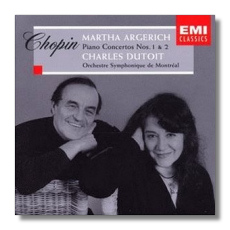
The Internet's Premier Classical Music Source
Related Links
- Chopin Reviews
- Latest Reviews
- More Reviews
-
By Composer
-
Collections
DVD & Blu-ray
Books
Concert Reviews
Articles/Interviews
Software
Audio
Search Amazon
Recommended Links
Site News
 CD Review
CD Review
Frédéric Chopin

Piano Concertos
- Concerto for Piano #1 in E minor, Op. 11
- Concerto for Piano #2 in F minor, Op. 21
Martha Argerich, piano
Montréal Symphony Orchestra/Charles Dutoit
EMI 56798
I am reading a book on the philosophy of science, Reliable Knowledge, by John Ziman. It is a rough row to hoe, but worth the effort. In it he describes "discovery" as 'the outcome of a particular kind of experiment or observation that falsifies a null hypothesis.' I thought of that as I wrote that listening to this recording was a 'discovery' for me. In a way, writing reviews is a particular kind of experiment and in this case I found that Chopin's piano concerti are good (the null hypothesis put to rest) and that Argerich is a fantastic performer. Now, in this case it may well be that the artist is the variable in the experiment that has led to the discovery and therefore I have made two discoveries that are interrelated.
Enough of that. Discovery is also based on past experience. Earlier I reviewed the Prokofieff and Bartók Piano Concerti by this same team and waxed enthusiastic about it, so I wondered if they would have the same effect on Chopin. My prior experience in Chopin was colored largely by recordings by Rubinstein and the 'classic" account of #1 by Pollini and Kletzki (also on EMI). It so happens that at this same time American Record Guide has as its featured composer, Chopin. In it Don Vroon argues that Rubinstein's Chopin is "anti-romantic". Much as I hate to admit it, he may have a point here. All I know is that Argerich and Dutoit turn in a truly Romantic performance and God I love it.
I have listened Chopin more in the past five days than in the previous 20-some years I have been listening to classical music. In addition to this disc I also received Argerich's 1965 recordings of Chopin's Sonata #3 and some other instrumental pieces. (More on that in another review). Anyway, I decided I had to try to put my finger on just what it is that she has brought to this music that I haven't been aware of before.
I no longer have the concerti by Rubinstein, more evidence that I don't care for his approach. I did listen to the Pollini, and made a few observations. First, the orchestral contribution by Kletzki is much more "classical" in a manner à la Beethoven. The opening tread is almost militaristic. Dutoit is much more Romantic his strings, in particular, sweeter and more to the fore. Argerich has a liquid 'touch' on the keys such that the music seems to flow rather than be played. Pollini, in contrast, makes every note count, you can hear his fingers flying from key to key. This is not necessarily bad, but also is more like Beethoven than what I am hearing from Argerich. Where will you find examples of these touches? Everywhere. I had intended to draw you a map but realized that only a picture would really capture what I am trying to say. Since the only 'picture'* is the recording I guess I'll just have to tell you that you want this recording.
To tie up a loose end, I should mention the Second Concerto (actually written first but published second, much like Beethoven's first two). Well, I don't have a comparison at the moment and frankly I don't see any need for one. As I have already said, the past several days I have listened to this disc repeatedly. I even caught myself humming the music on one of my morning walks. This CD will be among my favorites and I am already checking out more Argerich. I just purchased her traversal of the Beethoven Violin Sonatas with Kremer and plan to explore them soon.
Finally a word about the sound of this record. Frankly, I was so taken by the performance that a conscious estimation of sound was never made. Obviously I did find it very good and it is better than the older Pollini recording.
The notes are okay, but the writer does spend some time putting down the music. I also should mention that I was disappointed, seriously, when I checked into Michael Steinberg's otherwise excellent reference, The Concerto and found that there was no discussion of either work. I did find some good points in Edward Downes' book, Guide to Symphonic Music where he repeatedly used the word "color" to discuss the works. Certainly Argerich and Dutoit find the color.
* The notion of the philosophic difference between a map and a picture is well discussed in Ziman's book.
Copyright © 1999, Robert Stumpf II


















